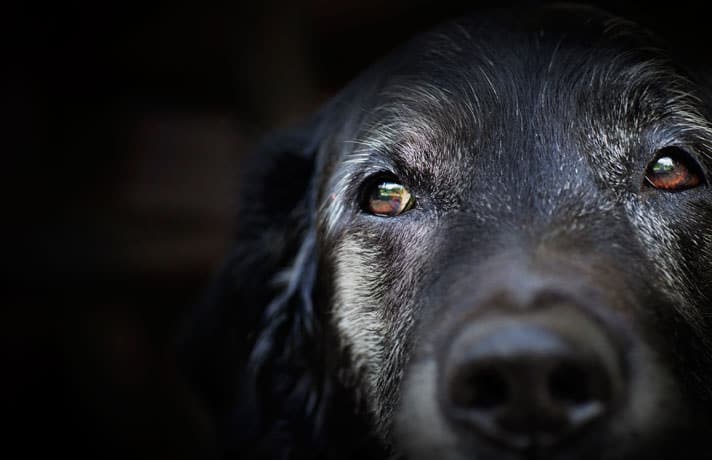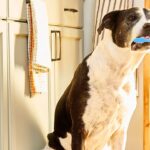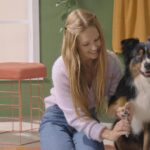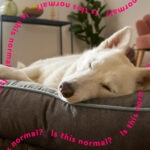Common Eye Problems In Senior Dogs

Photo by Chewy
Just as people have eye problems that develop with age, so do dogs, and they start to require more dog eye care. The most common eye problems of older dogs are cataracts, glaucoma and nuclear sclerosis. Blindness can develop from the first two conditions, and from retinal degeneration with age.
Dogs And Nuclear Sclerosis
“I think my dog has cataracts!” is a common complaint I hear from clients with older dogs. Luckily, most of the time, the problem is nuclear sclerosis, not a true cataract. Nuclear sclerosis is a bluing of the lens of the eye. This is caused by fibers growing into the clear lens as a normal part of aging. While this may cut down on visual acuity a bit, it does not destroy vision. So, when you look at most older dogs’ eyes and see a bluish haze, that is nuclear sclerosis, not a true cataract.
Cataracts In Dogs
Other changes in the eyes aren’t so benign. Cataracts can affect dogs from puppyhood on up but are most common in older dogs. Senile, or old age, cataracts generally first show up in dogs who are 6 to 8 years of age.
Changes start in the center of the lens and move out to the periphery. As the lens progressively becomes opaque, vision will be lost. Aging cataracts tend to develop in both eyes, but they may progress at different rates. Cataracts can also result from trauma or infection to the eye and secondary to diabetes mellitus.
Luckily, cataracts are not painful. You may notice a whitish sheen to the pupil or catch that your dog’s vision is failing. The coloration change needs to be differentiated from the benign nuclear sclerosis, which your veterinarian can do with an ophthalmoscopic exam.
The only real treatment for cataracts is surgery. The lens can be removed or it can be broken down by phacoemulsification—a process using ultrasound to break up the lens. The pieces are then removed from the eye. An artificial lens may be put into place or the eye may be left alone. Surgery is only attempted if vision has been lost in both eyes. This is a surgery that should be done by a board-certified veterinary ophthalmologist.
The Painful Pressure Of Glaucoma
While cataracts take some time to develop, glaucoma can come on very acutely.
Glaucoma occurs when the fluid produced by the eye builds up faster than it can drain. This causes an increase in pressure on the sensitive tissues of the eye — damaging the optic nerve and the retina. If left untreated, the damage is permanent and may lead to blindness.
Glaucoma can be primary or secondary, and it is quite painful. Dogs with glaucoma often avoid bright areas, tear excessively and may squint or simply hold their eyes closed. Primary glaucoma has a genetic basis and is seen in a number of breeds, including Beagles, Cocker Spaniels and Basset Hounds. In these cases, both eyes will be affected, though not always at the same time. For breeds with a predisposition to glaucoma, having the ocular pressure checked on every wellness visit is important. Your regular veterinarian can do that on a physical exam with a tonometer. Normal IOP (intraocular pressure) can range from 10 to 25 mm Hg. Dogs with glaucoma generally have pressures over 25 mm Hg.
Secondary glaucoma occurs after some other eye problem—trauma, a displaced lens or uveitis. In such cases, the original problem has to be addressed, along with treating the glaucoma.
Immediate treatment for glaucoma involves medical therapy. Drugs such as mannitol are used to lower the pressure in the eye. Topical medications will cause the pupil to constrict, which opens up the angles so fluid can drain more easily. Because dogs can go blind in hours from glaucoma; always seek veterinary attention right away if you suspect an eye problem in your pet.
If medical therapy is not effective, there are some surgical procedures that may help with glaucoma. Still, many old dogs with glaucoma will end up blind in the affected eye(s). If the eye continues to be painful, removal is recommended. You can get a prosthesis or simply have the eyelid sutured shut after removal.
Eye Irritants And Other Problems
Senior dogs can get any of the typical canine eye problems as well. Dust, sand or other foreign bodies in the eye, such as plant seeds, can irritate the conjunctiva or scratch the cornea. You may suddenly notice your dog is blinking a lot, squinting his eye, holding his eye shut or tearing. Flush his eye with artificial tears but always call your veterinarian. Eye problems can go from minor to vision-threatening in a very short time. I tell clients that an eye problem is worth the trip to the veterinary emergency clinic.
Blindness In Dogs
Dogs can go blind for a number of reasons with age, in addition to the conditions mentioned above. Certainly trauma is one cause, as well as chronic eye infections. Damage to the retina or nerve damage can result in vision loss.
Dogs who go blind over time often totally fool their families. While at home, on the territory they know well, many dogs function perfectly. I have seen blind dogs head out into a fenced yard and unerringly go to their favorite tree to eliminate. If your dog goes blind, it is important to leave furniture in the same locations. This is not a time for redecorating! Your dog will have a mental map of where everything is located and will navigate the house with ease as long as things are left in place.
Dogs see the world through smell and hearing more than vision. Being blind is not nearly as traumatic for them as it would be for a person. The exception can be a dog who goes acutely blind, as opposed to a long, gradual process. Those dogs will be disoriented and worried until they have time to adjust to a new reality.
If you have a dog who goes acutely blind, or end up moving to a new home with a blind dog, take the time to help your dog learn the new setup. Walk him on his dog leash around the house and yard. Decide where furniture will go and leave it there. Set up locations for dog food, water and your dog’s bed. Make sure he has a clear path to you when you call him.
Vision loss is not fun for you or your senior dog, but most older dogs adapt well and continue to enjoy life.



